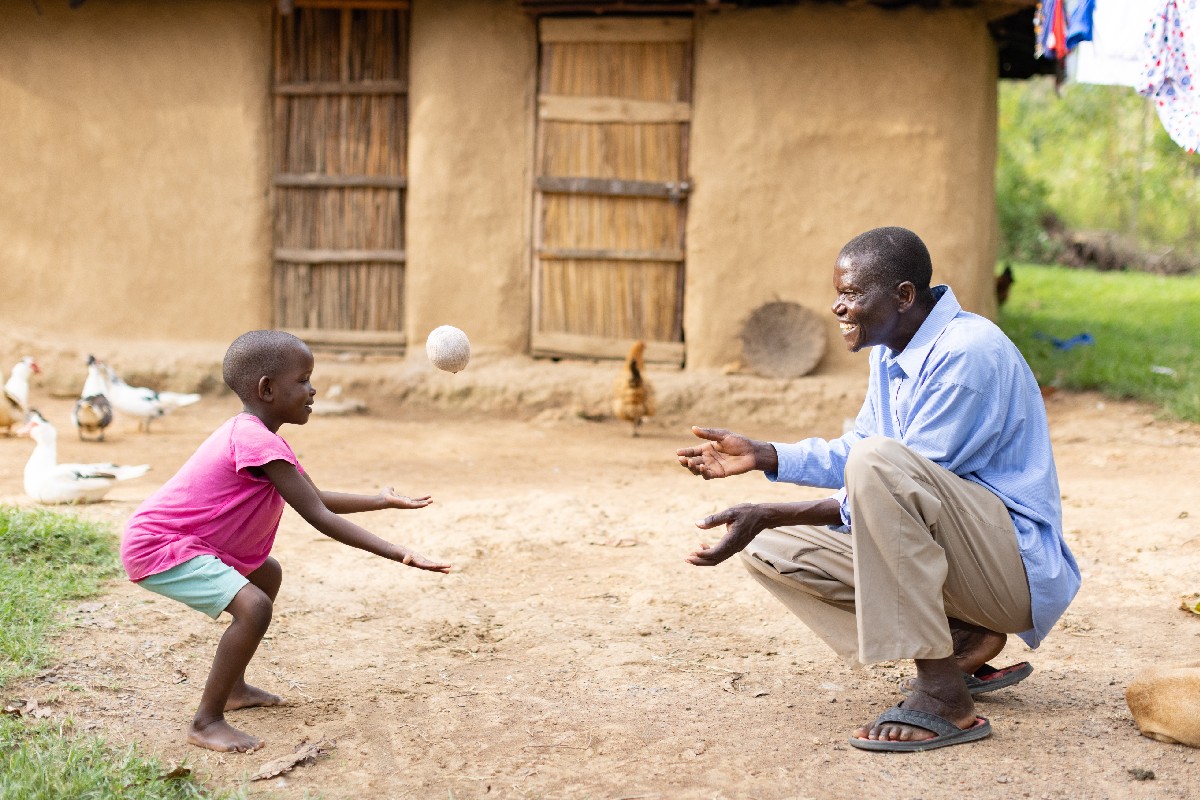
Alice Anukur

Francis (53) plays ball with his daughter, Mitshell (4) in Siaya County. ChildFund’s responsive parenting program has taught Francis how to be a more involved and loving father.
Why play with your child
When, parents, was the last time you played with your child?
You come home after a long day and all you want to do is collapse on the sofa and relax. And then, just as you are about to sit and take off your shoes, you hear it: “Daddy! Mommy! Please come and play with me. Please?”
At that moment, playing with your child seems like a bother. Now take a moment and think of all the long-term benefits—mentally, physically, and socially—for your child, especially when they play with you.
Play is so important to optimal child development that “it has been recognized by the United Nations High Commission for Human Rights as a right of every child” Engaging wholly with your child in play offers a great opportunity to build their self-esteem.
Imagine how your child must feel, knowing that the most significant person in their life and world likes them enough to take the time to play and engage with them. Also, research shows when you allow the play to be directed by the child, they benefit in a variety of ways. They get to move at their own pace, practice decision-making skills, and discover their own unique areas of interest. Research also reveals that child-directed play improves a child’s self-control, the way they handle their feelings, and how they feel about themselves and others. However, when play is controlled by adults, some of the benefits are lost, such as developing leadership, social and creative skills.
Children’s brain development is strengthened by play. It is how at a very early age; they engage with and interact with their world. As they explore and understand challenges, they also develop new and exciting competencies and skills which build their confidence and strengthen their resilience-both of which are needed to help them face future challenges in life as teenagers or adults. A child’s development is positively affected by consistent and loving relationships with parents as they interact through play. Simply put, the bonds between parent and child are built and made stronger when they play together.
Playing with your child is beneficial to you, as well. Research has shown that when parents play with their child, the hormone, oxytocin, is released. Oxytocin is responsible for trust and relationship building. Oxytocin also counteracts the effects of stress, reducing blood pressure, anxiety, and fear. So at the end of the day- quite literally, play is a win-win for both you and your child!
The whole family is encouraged to take part in play- mommy, daddy, and the children.
Family activities are great for the whole family. They help develop strong family bonds which can last a lifetime. It can be said that a family that plays together stays together.
With play, members of the family become more cooperative, supportive and have open communication. These qualities pay off big dividends by increasing self-esteem, social skills, and a sense of connectedness that helps children to have good judgment when confronted with difficulties.
So, for you to be a good playmate for your child all you need to do is actively observe, listen to their stories, support their chosen mode of play, and engage in conversation.
Ensure you provide mutual interaction without continually intervening or controlling the conversation. Allow your child to explore their environment and sensations. Let them draw you in. Then be actively engaged and collaborate, this will teach your child to do the same in his future interactions.
Next time your child asks you to play with them, jump at the idea and embrace it as a way of building a lasting bond with them, preparing them for the future, and getting your workout while making the child feel loved and appreciated!
This op-ed was first published by the Daily Nation.




